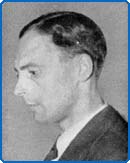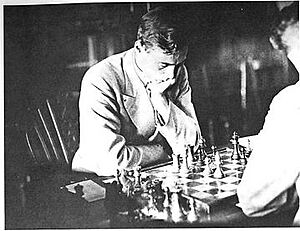Conel Hugh O'Donel Alexander facts for kids
Quick facts for kids Conel Hugh O'Donel Alexander |
|
|---|---|
 |
|
| Born | 19 April 1909 Cork, County Cork, Ireland |
| Died | 15 February 1974 (aged 64) Cheltenham, Gloucestershire, England |
| Title | International Master (1950) |
Conel Hugh O'Donel Alexander, known to many as Hugh Alexander, was an amazing British person born in Ireland. He was famous for three main things: being a brilliant cryptanalyst (someone who cracks secret codes), a fantastic chess player, and a writer about chess. During World War II, he worked at a top-secret place called Bletchley Park, where he helped break the German Enigma machine codes. After the war, he led the codebreaking team at GCHQ for 25 years. He also won the British Chess Championship twice and earned the special title of International Master in chess.
Contents
Hugh Alexander's Early Life and Education
Hugh Alexander was born on April 19, 1909, in Cork, Ireland. His family was Anglo-Irish. His father, Conel William Long Alexander, was a professor of engineering. When Hugh was 11, his father passed away. His family then moved to Birmingham, England.
Hugh was a very smart student. He attended King Edward's School, Birmingham. Later, he won a scholarship to study mathematics at King's College, Cambridge. He graduated with top honors in 1931. While at Cambridge, he also played chess for the university team.
In 1932, Hugh started teaching mathematics at Winchester College. He married Enid Constance Crichton Neate in 1934. They had two sons, Michael and Patrick. In 1938, Hugh left teaching to become a research head at a company called the John Lewis Partnership.
The Second World War began in 1939 while Hugh was playing in a chess tournament in Argentina. He and his team had to stop playing and quickly return to the UK to help with the war effort.
A Secret War Hero: Codebreaking at Bletchley Park
In February 1940, Hugh Alexander joined the secret team at Bletchley Park. This was the main British center for cracking enemy codes during World War II. He first worked in a section called Hut 6. This team focused on breaking the secret messages sent by the German Army and Air Force using their Enigma machines.
Cracking the Enigma Code
The Enigma machine was a complex device used by the Germans to send coded messages. Breaking these codes was incredibly important for the Allies to understand enemy plans and win the war. In 1941, Hugh moved to Hut 8, which worked on the German Naval Enigma codes. These were even harder to crack!
Leading the Codebreakers
Hugh Alexander became the second-in-command of Hut 8, working closely with the famous mathematician Alan Turing. Hugh was very involved in the daily work of the hut. When Alan Turing was away, Hugh officially took over as the head of Hut 8 around November 1942. He worked with other brilliant minds like Stuart Milner-Barry and Gordon Welchman. In 1944, he moved to work on breaking Japanese codes.
After the War: GCHQ
After World War II ended, Hugh Alexander continued his important secret work. In 1946, he joined GCHQ. This organization took over from Bletchley Park and continued to protect Britain's communications and gather intelligence. By 1949, Hugh was promoted to lead the entire codebreaking division, a role he held for 25 years until he retired in 1971. For his amazing contributions, he received several special honors from the British government.
A Chess Champion
Hugh Alexander was also a fantastic chess player. He played for Cambridge University in important matches from 1929 to 1932. He won the British Chess Championship twice, first in 1938 and again in 1956.
Playing for England
Hugh represented England in the Chess Olympiad six times. This is a big international team chess tournament. He played in 1933, 1935, 1937, 1939, 1954, and 1958. As mentioned before, he had to leave the 1939 Olympiad early because of the war. He also served as the non-playing captain for England's team from 1964 to 1970. He was given the title of International Master in 1950.
His Legacy in Chess
Many chess experts believe Hugh Alexander could have become a Grandmaster, which is the highest title in chess. However, his most active years for chess (his late twenties and early thirties) were during World War II. During this time, he was busy with his secret codebreaking work and couldn't play in many top-level tournaments.
Despite this, he achieved some incredible results. He won the Hastings tournament in 1946/47. He also tied for first place at Hastings in 1953/54, where he didn't lose a single game and even beat two strong Soviet grandmasters. Because of his secret work, he wasn't allowed to play chess in countries like the Soviet Union. Hugh also wrote a popular chess column for The Sunday Times newspaper.
Books by Hugh Alexander
Hugh Alexander wrote several books about chess, sharing his knowledge and love for the game. Some of his well-known books include:
- Fischer v. Spassky (about a famous chess match)
- The Penguin Book of Chess Positions
- Alexander on Chess
- Learn Chess: A New Way For All (Volumes One and Two)
 | William M. Jackson |
 | Juan E. Gilbert |
 | Neil deGrasse Tyson |


